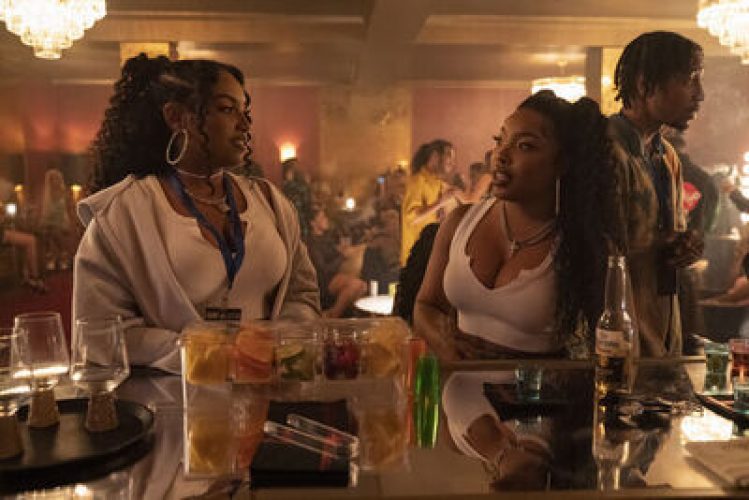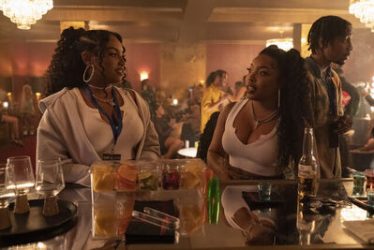When writer, actor, and director Issa Rae’s sophomore Max show “Rapsh!t” first premiered last summer, it was quickly, and correctly, branded a triumph for the multihyphenate creator. The new series shared some DNA with Rae’s brilliant first TV project “Insecure”—a focus on black female friendship, career struggles, social awkwardness, and the joys and pains of growing up—this new series is very much its own world, transposing the action from friends in LA to aspiring rappers in Miami. Season two, delayed from its initial summer 2023 premiere date due to the WGA and SAG strikes, returns this week with the same panache, albeit in slightly more muted tones, due to a compelling focus on cyclical poverty, mental health, and the superficiality of the recording industry.
Now an official rap group, Mia Knight (KaMillion) and Shawna Clark (Aida Osman) are set to open on white rapper Reina Reign’s (Kat Cunning) tour. Their manager Chastity (Jonica Booth) is with them, though she is struggling to define her role or worth in the face of smarmy opposition from Reina’s producer Francois (Jaboukie Young-White, finding new levels of elitist villainy on television). Shawna and Mia are excited to start on a new chapter of their dreams, but other issues continue to cloud their view of the future. Reina barely bothers to mask elitist and racist contempt for Mia and Shawna’s contributions to the tour; the writing does a great job highlighting Reina’s appropriation of black music and culture while racking up laugh after laugh. Mia still hasn’t found firm footing with her child’s father Lamont (RJ Cyler); they aren’t together, but love their daughter equally, and it was his terrific producing skills that helped the pair’s “Seduce and Scheme” to become a hit. Shawna is being investigated for credit card fraud by law enforcement; this subplot is a direct reference to the legal troubles of JT, a member of City Girls, the Miami female rap duo who serve as the inspiration for “Rapsh!t.”
There are significant changes in the structure of season two. I’m appreciative of the writers opting for less social media-as-framing narrative devices this season. Most of the first season was lensed through Instagram Stories, FaceTime conversations, TikToks, etc. While I fully understand the prominent role social media clout plays in hip-hop, the grumpy Millennial in me, who neither uses nor knows how to use most of the aforementioned apps (I don’t even like FaceTime; just talk to me on the phone like it’s 2004), found it distracting, and sometimes confusing. There’s less of that this season, and the amount of FaceTime calls or Instagram Lives don’t interrupt the flow of the story.
The writing in season two displays the vibrant specificity of a world we, the audience, get to explore. I know very little about the intersection of rap stardom and social media, but its exploitative nature seems very similar to the struggles writers have in getting the attention of editors and publications, and having to constantly advertise our work on social media. I’m not an aspiring rapper, but few things are as relatable as Shawna’s sigh of disgust when her bank notifies her that her checking account has dipped below $25, for the tour pays only in exposure. The craven nature of the recording industry and its impact on vulnerable artists is explored in, frankly, shocking ways this season, creating a spiderweb of potential discussions about mental health, the precarity of life as an artist, and prejudice against mental illness in communities of color. Most of the themes explored in the first six episodes of season two can be extrapolated to most people’s lives; the precision of the writing makes these stories even more engaging, and that’s a true victory for the writers’ room.
The acting is a treat too. RJ Cyler is very believable as Lamont, a man largely disinterested in the whims of his child’s mother. Brittney Jefferson and DomiNque Perry are hilarious as Mia’s friends Alesia and Nelly, respectively; their physical comedy is the funniest thing I’ve seen on TV this year. Aida Osman plunges into greater emotional depths this season, struggling with the fear of going to prison and losing the love of her family. But it’s KaMillion who steals the show. The daughter of an incarcerated father and an unpredictable alcoholic mother, Mia is tough, willing to do just about anything to protect her child’s future. Having left a thriving OnlyFans behind in order to pursue her rapper dreams with Shauna, Mia remains a complicated figure, toying with a roster of men, anxious about the impact of her volatile mother’s behavior on Melissa, her elementary school-age daughter with Lamont. Whether she’s rolling her eyes or batting her foot-long lashes, KaMillion holds the camera’s gaze with supernatural ease. The actress could give classes in seamless body language. In one moment, Mia may be raring to go, her limbs taut with indignation, but in the next, her muscles loosen, her manner as easygoing as a light breeze, acknowledging her contradictory personality with a calm shrug of her shoulders. KaMillion’s performance is an absolute delight, and I hope “Rapsh!t” is only part of the beginning of her long career in TV and film.
Writer and actor Rene Gube, upon accepting the 2023 WGA Award for Best Comedy Series on behalf of “The Bear,” said, “We answered the age-old question, ‘Does comedy have to be funny?’ And the answer is, ‘Kinda? Sometimes.’” “Rapsh!t” remains a comedy, but with more dramatic elements than before, digging deeper into darker themes; “Ramy” opted for this tonal shift too, and became an even better show for it. “Rapsh!t” appears to be on the same trajectory. This is Issa Rae’s world; we just live (and get to enjoy) it.
First six episodes of season two screened for review. Premieres on Max today, November 9.
When writer, actor, and director Issa Rae’s sophomore Max show “Rapsh!t” first premiered last summer, it was quickly, and correctly, branded a triumph for the multihyphenate creator. The new series shared some DNA with Rae’s brilliant first TV project “Insecure”—a focus on black female friendship, career struggles, social awkwardness, and the joys and pains of growing up—this new series is very much its own world, transposing the action from friends in LA to aspiring rappers in Miami. Season two, delayed from its initial summer 2023 premiere date due to the WGA and SAG strikes, returns this week with the same panache, albeit in slightly more muted tones, due to a compelling focus on cyclical poverty, mental health, and the superficiality of the recording industry. Now an official rap group, Mia Knight (KaMillion) and Shawna Clark (Aida Osman) are set to open on white rapper Reina Reign’s (Kat Cunning) tour. Their manager Chastity (Jonica Booth) is with them, though she is struggling to define her role or worth in the face of smarmy opposition from Reina’s producer Francois (Jaboukie Young-White, finding new levels of elitist villainy on television). Shawna and Mia are excited to start on a new chapter of their dreams, but other issues continue to cloud their view of the future. Reina barely bothers to mask elitist and racist contempt for Mia and Shawna’s contributions to the tour; the writing does a great job highlighting Reina’s appropriation of black music and culture while racking up laugh after laugh. Mia still hasn’t found firm footing with her child’s father Lamont (RJ Cyler); they aren’t together, but love their daughter equally, and it was his terrific producing skills that helped the pair’s “Seduce and Scheme” to become a hit. Shawna is being investigated for credit card fraud by law enforcement; this subplot is a direct reference to the legal troubles of JT, a member of City Girls, the Miami female rap duo who serve as the inspiration for “Rapsh!t.” There are significant changes in the structure of season two. I’m appreciative of the writers opting for less social media-as-framing narrative devices this season. Most of the first season was lensed through Instagram Stories, FaceTime conversations, TikToks, etc. While I fully understand the prominent role social media clout plays in hip-hop, the grumpy Millennial in me, who neither uses nor knows how to use most of the aforementioned apps (I don’t even like FaceTime; just talk to me on the phone like it’s 2004), found it distracting, and sometimes confusing. There’s less of that this season, and the amount of FaceTime calls or Instagram Lives don’t interrupt the flow of the story. The writing in season two displays the vibrant specificity of a world we, the audience, get to explore. I know very little about the intersection of rap stardom and social media, but its exploitative nature seems very similar to the struggles writers have in getting the attention of editors and publications, and having to constantly advertise our work on social media. I’m not an aspiring rapper, but few things are as relatable as Shawna’s sigh of disgust when her bank notifies her that her checking account has dipped below $25, for the tour pays only in exposure. The craven nature of the recording industry and its impact on vulnerable artists is explored in, frankly, shocking ways this season, creating a spiderweb of potential discussions about mental health, the precarity of life as an artist, and prejudice against mental illness in communities of color. Most of the themes explored in the first six episodes of season two can be extrapolated to most people’s lives; the precision of the writing makes these stories even more engaging, and that’s a true victory for the writers’ room. The acting is a treat too. RJ Cyler is very believable as Lamont, a man largely disinterested in the whims of his child’s mother. Brittney Jefferson and DomiNque Perry are hilarious as Mia’s friends Alesia and Nelly, respectively; their physical comedy is the funniest thing I’ve seen on TV this year. Aida Osman plunges into greater emotional depths this season, struggling with the fear of going to prison and losing the love of her family. But it’s KaMillion who steals the show. The daughter of an incarcerated father and an unpredictable alcoholic mother, Mia is tough, willing to do just about anything to protect her child’s future. Having left a thriving OnlyFans behind in order to pursue her rapper dreams with Shauna, Mia remains a complicated figure, toying with a roster of men, anxious about the impact of her volatile mother’s behavior on Melissa, her elementary school-age daughter with Lamont. Whether she’s rolling her eyes or batting her foot-long lashes, KaMillion holds the camera’s gaze with supernatural ease. The actress could give classes in seamless body language. In one moment, Mia may be raring to go, her limbs taut with indignation, but in the next, her muscles loosen, her manner as easygoing as a light breeze, acknowledging her contradictory personality with a calm shrug of her shoulders. KaMillion’s performance is an absolute delight, and I hope “Rapsh!t” is only part of the beginning of her long career in TV and film. Writer and actor Rene Gube, upon accepting the 2023 WGA Award for Best Comedy Series on behalf of “The Bear,” said, “We answered the age-old question, ‘Does comedy have to be funny?’ And the answer is, ‘Kinda? Sometimes.’” “Rapsh!t” remains a comedy, but with more dramatic elements than before, digging deeper into darker themes; “Ramy” opted for this tonal shift too, and became an even better show for it. “Rapsh!t” appears to be on the same trajectory. This is Issa Rae’s world; we just live (and get to enjoy) it. First six episodes of season two screened for review. Premieres on Max today, November 9. Read More


